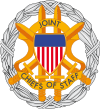Bernard W. Rogers
Bernard William Rogers (July 16, 1921 – October 27, 2008) was a United States Army general who served as the 28th Chief of Staff of the United States Army, and later as NATO's Supreme Allied Commander, Europe and Commander in Chief, United States European Command.
Bernard W. Rogers
July 16, 1921
Fairview, Kansas
October 27, 2008 (aged 87)
Falls Church, Virginia
United States
1940–1987
Besides the Distinguished Service Cross, Rogers' decorations included the Defense Distinguished Service Medal, the Silver Star, four awards of the Legion of Merit and three awards of the Distinguished Flying Cross.
Early life and education[edit]
Rogers was born in Fairview, Kansas on July 16, 1921.[1] He spent a year at Kansas State University,[2] where he was a member of Phi Delta Theta fraternity, before receiving an appointment to the United States Military Academy in 1940, where he was First Captain of the Corps of Cadets.[3] He graduated in June 1943 as Cadet First Captain (first in his class), and was commissioned a second lieutenant of Infantry. He was assigned to the 275th Infantry Regiment,[1] 70th Infantry Division,[3] and attended the officer basic course at the United States Army Infantry School at Fort Benning in preparation for a World War II combat assignment.
Later life and death[edit]
After his retirement in 1987, Rogers was a director of the Council on Foreign Relations and the Atlantic Council of the United States. He served on the boards of the USO and the Association of the United States Army and was a consultant and director to several companies, including Coca-Cola and General Dynamics.
Rogers died in 2008 at Inova Fairfax Hospital, Virginia, after suffering a heart attack.[11] He was survived by his wife of 63 years, Ann E. Rogers of McLean; three children, retired United States Army Colonel Michael W. Rogers of Manassas, Virginia, Diane Opperman of Arlington and Susan Kroetch of Alexandria; a sister; a brother; six grandchildren; and three great-grandchildren.
Rogers married Ann Ellen Jones in 1944.[1] He was an Honorary Director of The Atlantic Council of the United States,[12] and sat on the Association of the United States Army's Council of Trustees.[13] He was also a supporter of the Comprehensive Test Ban Treaty.[14] He was an Honorary Fellow of University College, Oxford, a member of the Council on Foreign Relations, of Phi Delta Theta Fraternity, and a Patron Councilor of the Atlantic Council of the United States.[15]
Other honors and awards he has received include:



